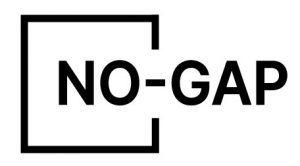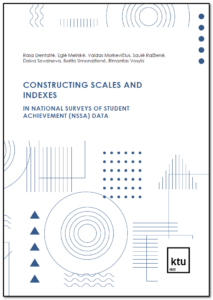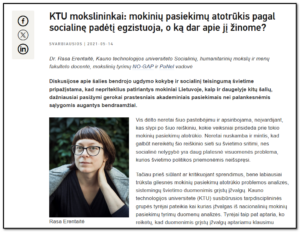
Mokslo straipsniai
Unpacking grading bias in middle school: A multilevel analysis of grade vs. test discrepancy considering student and school characteristics
Vosylis, R., Erentaitė, R., Simonaitienė, B., Melnikė, E., Sevalneva, D., Morkevičius, V., Žvaliauskas, G., & Hemker, B.
Studies in Educational Evaluation, 2024, Volume 83
DOI: https://doi.org/10.1016/j.stueduc.2024.101398
Abstract: Grade vs. test discrepancies and social biases in grading are complex phenomena shaped by the interplay of student characteristics, teacher behaviors, curricular elements, and the school environment. Despite this complexity, research examining how these phenomena vary across schools and in relation to school and curriculum-specific characteristics remains limited. This study delves into the discrepancy between grades and standardized math and national language test scores within a cohort of 18,812 8th-grade students in Lithuania nested in 418 schools. Multilevel regression analysis unveiled a pattern: female students were over-graded, whereas those from low socioeconomic backgrounds and those with special educational needs were consistently under-graded. Biases related to gender and special education needs varied significantly across schools, and the effects were linked to school characteristics. There were both similarities and differences in patterns for math and national language grading bias.
Uncovering Heterogeneity in Achievement During the Covid-19 Pandemic: Math Grades Trajectories and Their Predictors in Middle School
Erentaitė, R., Vosylis, R., Simonaitienė, B., Melnikė, E., & Sevalneva, D.
International Journal of Educational Research, 2023, Volume 121
DOI: doi.org/10.1016/j.ijer.2023.102231
Abstract: The study aimed to uncover the potential heterogeneity and its predictors in middle school students’ math achievement during the Covid-19 pandemic. The data covered yearly math grade point averages in 6th, 7th, and 8th grade and national test scores for a cohort of 17,685 Lithuanian students (49.1% females). Growth mixture modeling showed that between 2020 and 2022, most students showed a slight normative decline in their math achievement. Still, a few distinct subgroups have demonstrated either a steep decline or a slow to a rapid increase in their math grades, while almost one-third consistently underperformed in math. The findings reveal substantial heterogeneity in students’ results during the pandemic. Understanding these differential patterns can help target pandemic-related educational recovery efforts more accurately.
Profiles of Achievement Motivation and Performance in Middle School: Links to Student Background and Perceived Classroom Climate
Erentaitė, R., Vosylis, R., Sevalneva, D., Melnikė, E., Raižienė, S., & Daukantaitė, D.
Frontiers in Psychology (Educational Psychology), 30 May 2022, Volume 13
DOI: doi.org/10.3389/fpsyg.2022.820247
Abstract: Achievement motivation and performance at school are reciprocally related, however, empirical studies report a large variability of findings and, in some cases, weaker than expected associations between these constructs. To further our understanding of the motivation–performance link, we examined typical patterns of motivation and performance and their correlates, in two cohorts of 8th-grade students (N1 = 998, N2 = 441). As expected, we identified both concordant and discordant patterns of achievement motivation and performance. In two subgroups, specifically, those characterized by low motivation and low performance (34% of the sample) and those characterized by high motivation and high performance (18% of the sample), the levels of motivation were highly concordant with scores on math and reading tests. In contrast, the other two profiles—weak motivation with elevated performance (38% of all sample) and high motivation with low performance (9% of the sample) had divergent patterns of motivation and performance. The subgroups also differed on student socio-economic background, special educational needs, gender, as well as perceptions of classroom climate. Overall, our findings reveal context-dependent patterns of the relationship between aspects of achievement motivation and performance.
Measuring family wealth among secondary school students with home possessions indicators: Investigation of dimensionality and measurement problems
Morkevičius, V., Erentaitė, E., & Raižienė, S.
Frontiers in Education (Assessment, Testing and Applied Measurement), 23 November 2022, Volume 7
DOI: doi.org/10.3389/feduc.2022.1050460
Abstract: This article investigates methodological problems of measuring family wealth among secondary school students with home possessions indicators. It employs multiple correspondence analysis (MCA) in order to explore (1) the dimensionality of home possessions items, (2) the nature of relationship between these items, and (3) the substantive meaning of the first and other relevant dimensions. It also employs regression analysis in order to study potential explanatory factors of the second dimension of the MCA solutions that may be related to measurement problems of the instrument. Two sources of data are used: (1) open access data from the National Survey of Student Achievement (NSSA) in Lithuania that provide a series of national educational studies conducted from 2002 to 2016, and (2) data from the Programme for International Student Assessment (PISA) study conducted in Lithuania in 2018 that is used to corroborate findings produced using the first data source. Results of the data analysis show that the first dimension of MCA solutions obtained from home possessions items in both NSSA and PISA data sets reflect high vs. low socio-economic status (SES) of the students. However, there is at least one more important dimension, and it reveals multi-dimensional nature of the measurement instrument. Analysis of potential explanatory factors of the second dimension of the MCA solutions revealed that reading abilities and school-related affect is related to this dimension. Thus, the second dimension of MCA solutions might also reflect methodological problems related to the measurement of home possessions in adolescent surveys.
Psychometric qualities of the educational identity processes scale (EIPS)
Christiaens, A.H.T., Nelemans, S.A., de Moor, E.L., Erentaitė, R., Vosylis, R., & Branje, S.
Frontiers in Psychology, 19 April 2022, volume 13
DOI: doi.org/10.3389/fpsyg.2022.861220
Abstract: In the educational domain, the development of identity becomes especially salient during school transition phases. To assess the specific identity processes that match the adolescents’ experiences before and after the school transition, the Educational Identity Processes Scale (EIPS) was developed. The present study aimed to test the psychometric qualities of the EIPS by examining its factor structure, the internal and convergent validity of the identity dimensions, and whether the questionnaire was measurement invariant over time. The pre-transition version was tested in a Dutch sample (N = 242 early adolescents) and the post-transition version was tested in a Lithuanian sample (N = 1,268 mid-adolescents). Findings indicated good psychometric qualities for both the pre- and post-transition versions of the EIPS. Additionally, context dependencies were observed, as distance to the transition influenced the meaning of specific identity processes and determined whether specific processes could be considered as part of normative development.
Metodinė priemonė
Constructing Scales and Indexes in National Surveys of Student Achievement (NSSA) Data 
Erentaitė, R., Melnikė, E., Morkevičius, Raižienė S., V., Sevalneva, D., Simonaitienė & Vosylis, R.
In the context of digitalization and the complex challenges facing contemporary educational systems and institutions, data collected in educational settings have the potential to become a central resource for educational organizations and other stakeholders. In relation to that, the aim of this methodological guide is to present some of the analytical possibilities provided by the open-access data, collected in Lithuanian secondary schools during 2012-2016. The guide presents a number of ready-made, reliable indicators for the analysis of academic achievement in the context of socioeconomic disparities among Lithuanian middle school students. The indicators cover students’ socioeconomic background, academic achievement, students’ experiences and perceptions of school and home environment, as well as their relationships with teachers and parents. The guide will help university students and teachers in the field of educational science to get familiarized with the key constructs used in quantitative educational studies, as well as learn the psychometric approaches frequently applied in the analysis of educational data.
Mokslo populiarinimo ir profesiniai straipsniai
Neguodžiančios KTU mokslininkų įžvalgos: tikėtina, kad ir ateityje turėsime prastus matematikos egzaminų rezultatus. Kauno technologijos universiteto portalas, 2023-08-28. 
Erentaitė, R., Melnikė, E., Morkevičius, V., Simonaitienė, B., Vosylis, R., & Žvaliauskas, G. (2003). Mokinių mokymosi pasiekimų skirtumai ir kaip juos mažinti?. „Švietimo naujienos“, 2023-07-03. Vilnius: Nacionalinė švietimo agentūra.
Erentaitė, R. Disparities in student achievement: a prototype of educational analytics tool NO-GAP// EARA newsletter / editor Olga Solomontos-Kountouri, guest editor Rasa Erentaite. Nicosia: European Association for Research on Adolescence. 2023, May, p. 18-19.
KTU mokslininkai: Mokinių pasiekimų atotrūkis pagal socialinę padėtį egzistuoja, o ką dar apie jį žinome? KTU portalas, 2021-05-14.
Konferencijų pranešimų tezės
Vosylis, R., Melnikė, E., Sevalneva, D., & Erentaitė, R. (2023). Uncovering heterogeneity in math achievement trajectories in middle school during the Covid-19 pandemic. In European Conference on Developmental Psychology (ECDP) 28 August – 1 September, 2023 Turku, Finland (pp. 199-200).
Raižienė, S., Sevalneva, D., Erentaitė, R. (2022). What is the effect of emotional engagement and bullying on achievement gap: Multilevel analysis. In the 15th annual International Conference of Education, Research and Innovation, ICERI2022 PROCEEDINGS (pp. 2363).
Sevalneva, D., Erentaitė, R., Raižienė, S., & Vosylis, R. (2022). What is the best analytical strategy for identifying multiple school-level predictors of SES achievement gap? In 13th international multilevel conference, April 12-13, 2022: conference program & abstracts (pp. 1-1). Utrecht: Utrecht University.
Melnikė, E., Raižienė, S., Sevalneva, D., & Erentaitė, R. (2021). Investigating academic resilience: what could help to mitigate SES-related achievement inequalities. In ECER 2021: Education and society: expectations, prescriptions, reconciliations, 2-3 September (ERC), 6-10 September (ECER) 2021, Geneva, online (pp. 1-1). Berlin: European Educational Research Association.
Erentaitė, R., Vosylis, R., Morkevičius, V., Simonaitienė, B., & Žvaliauskas, G. (2021). Socio-economic gaps in achievement among students and schools in the context of rural-urban divide. In ECER 2021: Education and society: expectations, prescriptions, reconciliations, 2-3 September (ERC), 6-10 September (ECER) 2021, Geneva, online (pp. 1-1). Berlin: European Educational Research Association.
Morkevičius, V., Erentaitė, R., Vosylis, R., Melnikė, E., Sevalneva, D., Raižienė, S., & Simonaitienė, B. (2021). Measuring socioeconomic status among middle school students: does atypicality of responses matter for predicting academic achievement? In AEA-Europe 2021: assessment for changing times: opportunities and challenges, 2-5 November, 2021, online: conference abstracts (pp. 32-32). Nicosia: Easy Conferences.
Erentaitė, R., Sevalneva, D., Melnikė, E., & Gudynas, P. (2021). No one fit for all: different profiles of academic, interpersonal and motivational school functioning among 8th grade students. In ISPA 2021: 42nd annual HYBRID conference of the International School Psychology Association “Working with schools & families to strengthen children”, 13-16 July, 2021, Nicosia, Cyprus: book of abstracts (pp. 70-70). Amsterdam: International School Psychology Association (ISPA).


